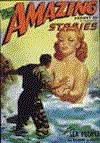|
|
|
U.S. publishers can learn from Japanese comics March 15, 2001 By Franklin Harris Manga is a $6 billion industry in Japan, with manga books and magazines accounting for more than one-third of all books and magazines sold there. Manga is Japanese for comics, and the Japanese are wild about their comics. I mention this by way of contrast. Last week, I wrote about how "Green Arrow" No. 1 was flying off the stands, selling out its original print run of more than 100,000 copies. It's a runaway best seller, the sixth-best selling comic book in America, according to Diamond Comic Distributors Inc. But everything is relative. Today, in America, a comic book that sells 30,000 copies is a modest hit. Coincidentally, 30,000 is the preorder total for the first issue of Warren Ellis' upcoming miniseries, "Ministry of Space," which I previewed in this column two weeks ago. (It's not too late, by the way, for you to venture down to the nearest comic-book retailer and ask him to order you a copy. I've seen the preview art, and you won't be disappointed.) Fifteen years ago, selling only 70,000 copies a month got you canceled. Now it gets you steady work and invites to all the big comic-book conventions. The American comic-book industry in mired in recession bordering on depression for several reasons. Comics are expensive. Comics have more competition -- from other forms of entertainment, from video games to video rentals to compact discs -- than ever before. Comic books have an image problem, and most people see them as being strictly for children, an impression not helped by the fact that comic books are dominated by Spandex-clad superheroes. And comics not dominated by superheroes are hard to find. They sit on shelves gathering dust until shop owners give up on them and use them for insulation. Of course, nearly everyone in the comics industry has a solution, all of which are more easily uttered than implemented. First, publish more comics in trade-paperback format and get them into more real bookstores, where people who don't frequent comic-book specialty shops might find them. Second, diversify. Publish books about more than just superheroes and supervillains. Even good superhero books, like the ones Marvel Comics' Marvel Knights imprint has been producing for the past few years, aren't going to appeal to more than a small audience. Third, learn from the Japanese. So what can we learn from the Japanese? Well, let's look at manga for a moment. The Japanese print their comics on paper just one grade better than the stuff you keep on a little roll in the bathroom. It's cheap, and the price of the average manga magazine reflects that. Two hundred yen, which five minutes ago was equal to about $1.67, will buy you a black-and-white manga magazine the thickness of a metropolitan telephone book. As for content, there is little that Japanese publishers won't print in comic-book form. Manga subject matter ranges from science fiction and fantasy to romance to sports to historical fiction to nonfiction to, most infamously, porn. And, obviously, only part of it is intended for children. Businessmen think nothing of reading manga on the trains to and from work. Manga anthology magazines serialize numerous ongoing stories weekly (or biweekly or monthly), and, eventually, popular stories end up collected in book form. America has nothing like the manga magazine, and most manga series imported into North America end up Americanized -- chopped into 32-page installments and sold for $3 a pop. Exceptions are Viz Comics' "Animerica Extra" and adult-oriented "Pulp" magazine and Dark Horse Comics' "Super Manga Blast!" All three are excellent big-bang-for-the-buck anthology titles. And both Viz and Dark Horse are good at releasing trade-paperback manga collections and keeping them in print. American publishers should take notice. An innovative company could start small, with just one anthology title collecting several stories by some the industry's top creators. Maybe one of the stories could even be about superheroes, just to hedge bets and at least get the usual fanboys to try it out. And, yes, I know American anthology titles have traditionally flopped. "Dark Horse Presents," "Oni Double Feature" and "Flinch" are only the most recent anthology comics to meet with cancellation. But they didn't feature ongoing stories and consistent creative teams. They were more "Twilight Zone"-like in their approach, with totally new stories and characters each issue. Is following the Japanese model guaranteed to work? No. There are no guarantees. But when the American comic-book industry is getting excited about selling 100,000 issues of a comic, something has to be done. |

RECENT COLUMNS
Order a helping of Cartoon Network's 'Robot Chicken'
03/31/05
Campaign against video games is political grandstanding
03/24/05
Prize-winning author is 'Wrong About Japan'
03/17/05
Censored book not a good start
03/10/05
Some superhero comics are for 'fanboys' only
03/03/05
'Constantine' does well with its out-of-place hero
02/24/05
'80s publisher First Comics' legacy still felt
02/17/05
Director's cut gives new 'Daredevil' DVD an edge
02/10/05
Put the fun back into 'funnybooks'
02/04/05
Is 'Elektra' the end of the road for Marvel movies?
01/27/05
'House of Flying Daggers' combines martial arts and heart
01/20/05
Anniversary edition of 'Flying Guillotine' has the chops
01/13/05
Movie books still have role in the Internet era
01/06/05
Looking ahead to the good and the bad for 2005
12/30/04
The best and worst of 2004
12/23/04
'Has-been' Shatner is a 'transformed man'
12/16/04
© Copyright 2005 PULP CULTURE PRODUCTIONS
Web site designed by Franklin Harris.
Send feedback to franklin@pulpculture.net.